Don’t want to do gross chores yourself? 1 in 3 Americans have their partner do them.

Key takeaways:
- Nearly 50% of women did gross chores weekly or more often, compared to 40% of men
- People were willing to pay more money for someone to pick up dog poop than for someone to clean their toilet
- Almost 8 out of 10 people did gross chores themselves to save money
Maintaining a house is no joke—the average American spends a full day every month, or nearly two full weeks each year—just on cleaning and housework. This drain on time would be even larger, however, if people were willing to roll up their sleeves and do the dirtiest of chores, like cleaning the septic tank or removing dead pests. But even if extra time was created for this, would anyone really do it?
After speaking to more than 1,000 financially independent adults in the U.S., we've gleaned deep insight into the most avoided tasks around the home. Getting as dirty and gross as we could, we asked respondents to share if they've ever done such a task, how much they would pay to get out of the task and their true top reasons for avoiding them in the first place. If you're looking at your own level of "dirty" tolerance and wondering how it stacks up, you'll want to keep reading.
Greatest miseries in managing a household
Our research begins with a look into the most commonly avoided tasks within the home. We showed respondents a list of chores and asked them if they had ever personally completed them (even once).
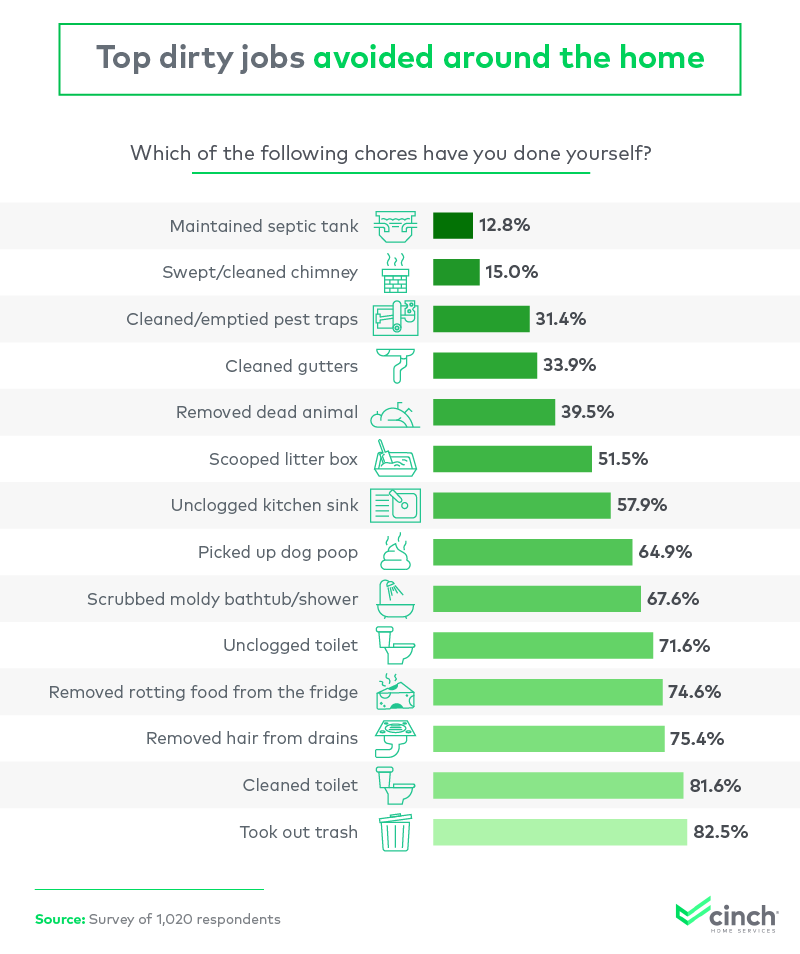
To our surprise, more than 1 in 10 respondents had attempted even the dirtiest chore we could think of—maintaining a septic tank. Even government agencies recommend leaving this type of work to a professional, yet 12.8% of respondents said they had done it themselves. Fortunately, they likely didn't have to do it very often: According to the Environmental Protection Agency, a septic tank should be pumped roughly once every three years or even less often for a very small home.
People were also highly self-sufficient for the more commonly necessary (yet still unpleasant) chores like cleaning the toilet and taking out the trash, which about 82% and 83% of respondents had done themselves, respectively. Roughly 72% had also unclogged a toilet themselves, while more than 3 in 4 had removed their own drain hair. Pets equated to some dirty jobs as well, which respondents were most often willing to do themselves. Almost 65% said they scooped their own dog poop, while 51.5% scooped their cat's litter box.
It appeared that most of the self-sufficiency was coming primarily from older generations. Nearly half of all Gen X had removed a dead animal from their property before, compared to just 1 in 3 millennials and 1 in 5 Gen Zers.
Paying to get out of household chores
If you're wondering what happens during the times when respondents weren't doing the chores themselves, look no further than this next piece of research, where we asked respondents about their willingness to spend money to get out of certain tasks.
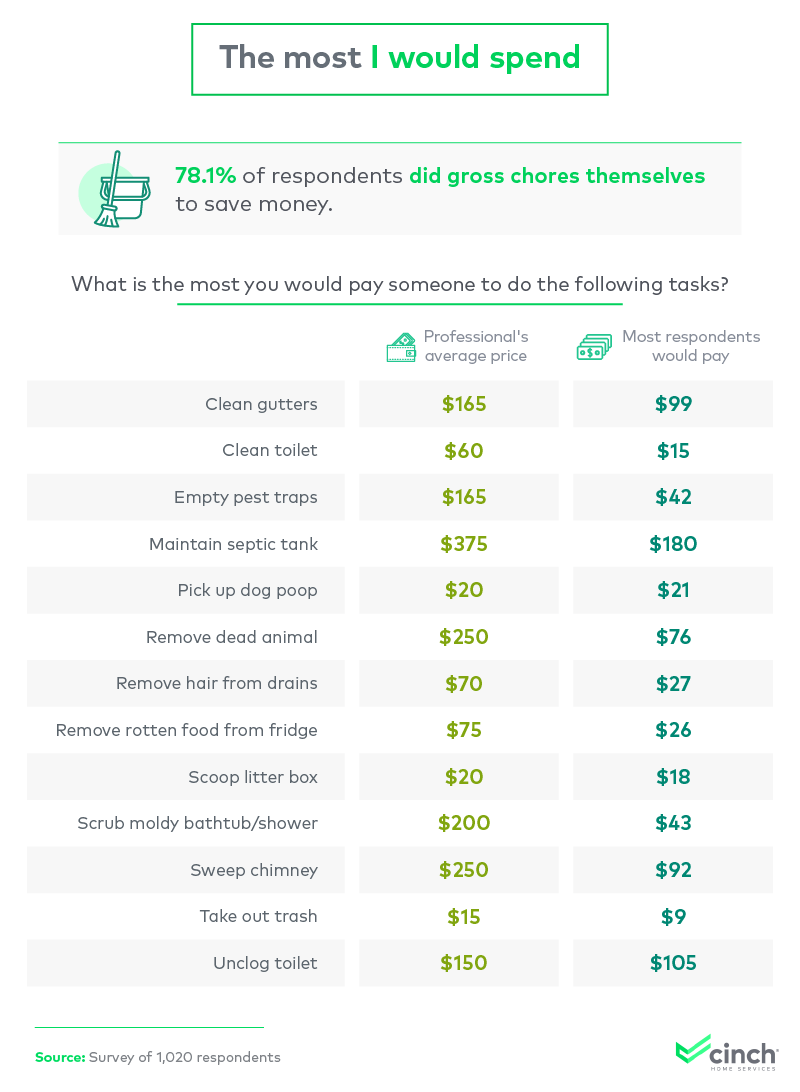
Money was evidently an enormous motivator for respondents doing tasks themselves, as opposed to the joy of self-sufficiency. More than 78% of respondents specifically said they delegated household chores to themselves for the purpose of saving money. That said, they were willing to spend on certain things. However, respondents were underestimating how much these tasks really cost. One reason for this might be that they never had to pay to get these tasks done, or simply avoided the necessary upkeep due to the related costs.
Picking up dog poop was the one and only chore where respondents were willing to spend more than what it actually costs a service to do. On average, respondents said they would pay someone $21 to pick up their dog's poop, yet services actually average just a $20 cost. For every other chore, however, the amount respondents were willing to pay was not enough to cover the true cost, hence the frequency of doing it themselves. Maintaining a septic tank, for instance, typically costs $375, yet respondents were only willing to pay $180.
Demotivators for the worst of tasks
Budget flexibility is not the only reason a person may outsource tasks—far from it. This component of our research looks at the most common barriers to respondents attempting household tasks themselves.
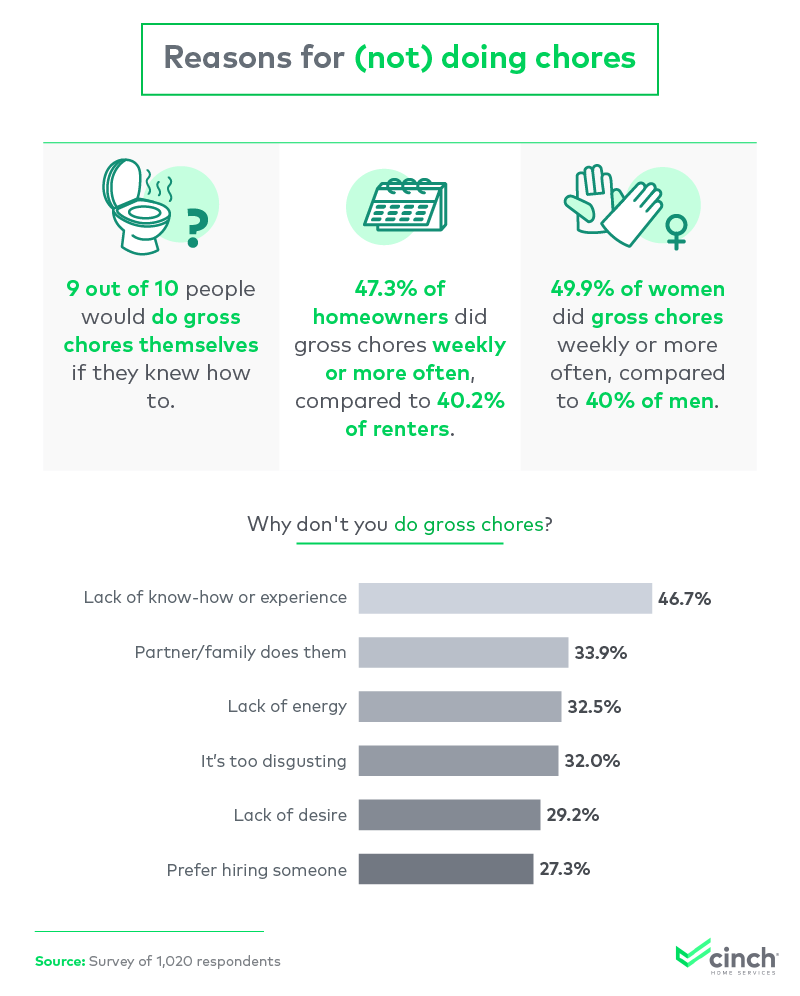
Knowledge was an enormous barrier to entry with regards to DIY household chores. A staggering 9 out of every 10 respondents said they would do even the grossest of chores if they just knew how. It is easy to imagine that not everyone has the know-how for gross chores, especially when it comes to those that aren't done on a regular basis. When we asked about their reasons for avoiding "gross chores," only 32% found the task too repulsive. Instead, the most common response was having a lack of know-how or experience to tackle the job (46.7%).
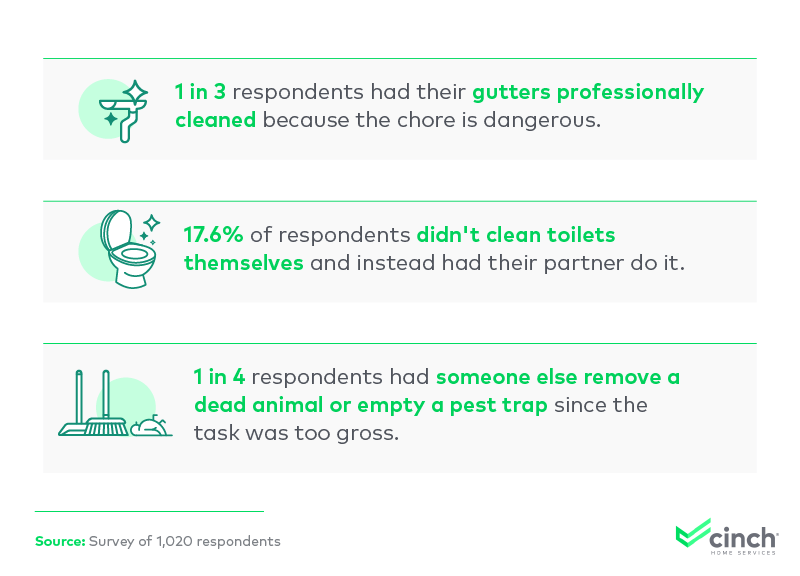
There also is very real danger to many of the chores we listed. Cleaning the gutters is not only dangerous but also a lot of work. One in 3 respondents told us they outsourced this task specifically because of the danger.
When we started to compare answers by gender, our findings were unfortunately consistent with traditional gender roles. Even the grossest of household tasks were typically falling to women more often than men. Half of all women reported doing these types of tasks weekly, compared to just 40% of men.
Imagine having some options
In a lighthearted game of "would you rather," we next asked respondents to consider two different household-related scenarios and choose their personal lesser of two evils.
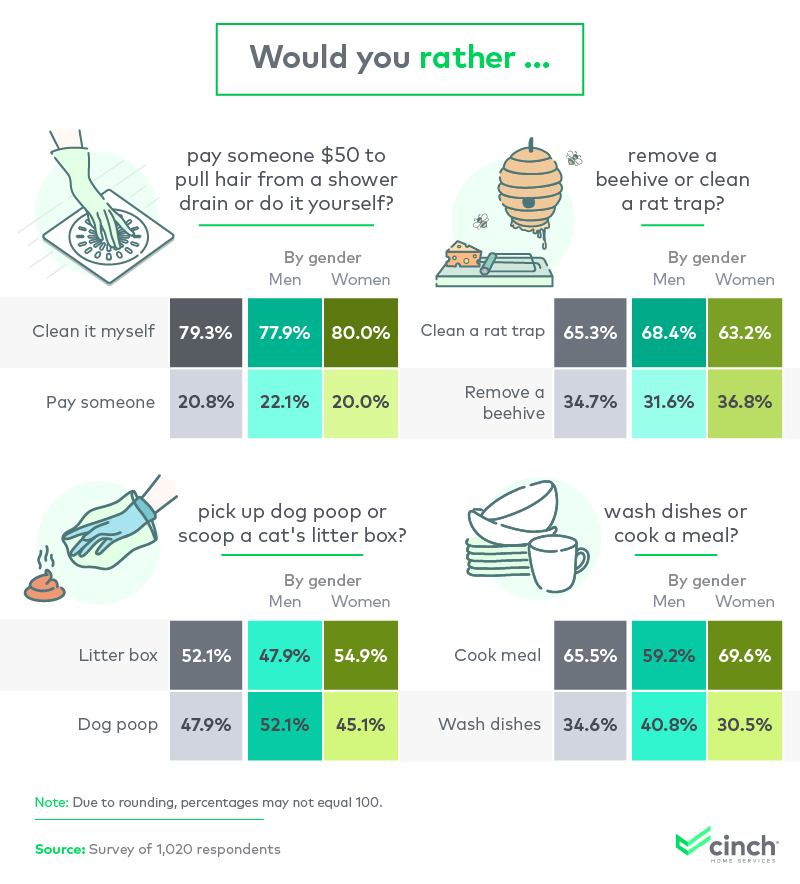
Our first question compared a dirty chore with money: Would you rather clean hair from a drain or pay someone $50 to do it? The vast majority of both men and women said they would prefer to keep the $50 and do it themselves. With money being such a clear motivator, we next started to compare individual chores against each other.
Would you rather clean a rat trap or remove a beehive? Most went with the safer (yet grosser) option of cleaning a rat trap. Only about a third chose the beehive. Unless you know what you're doing, removing a beehive not only poses an enormous danger to you, but to the hive itself. Especially in a time with bees being threatened with extinction, it may be better to choose the rat trap instead.
Easing your own chore burden
For the final piece of our study, we collected the top tips and tricks from people who clearly had a lot of experience doing their own home maintenance. Their most common advice is listed below.
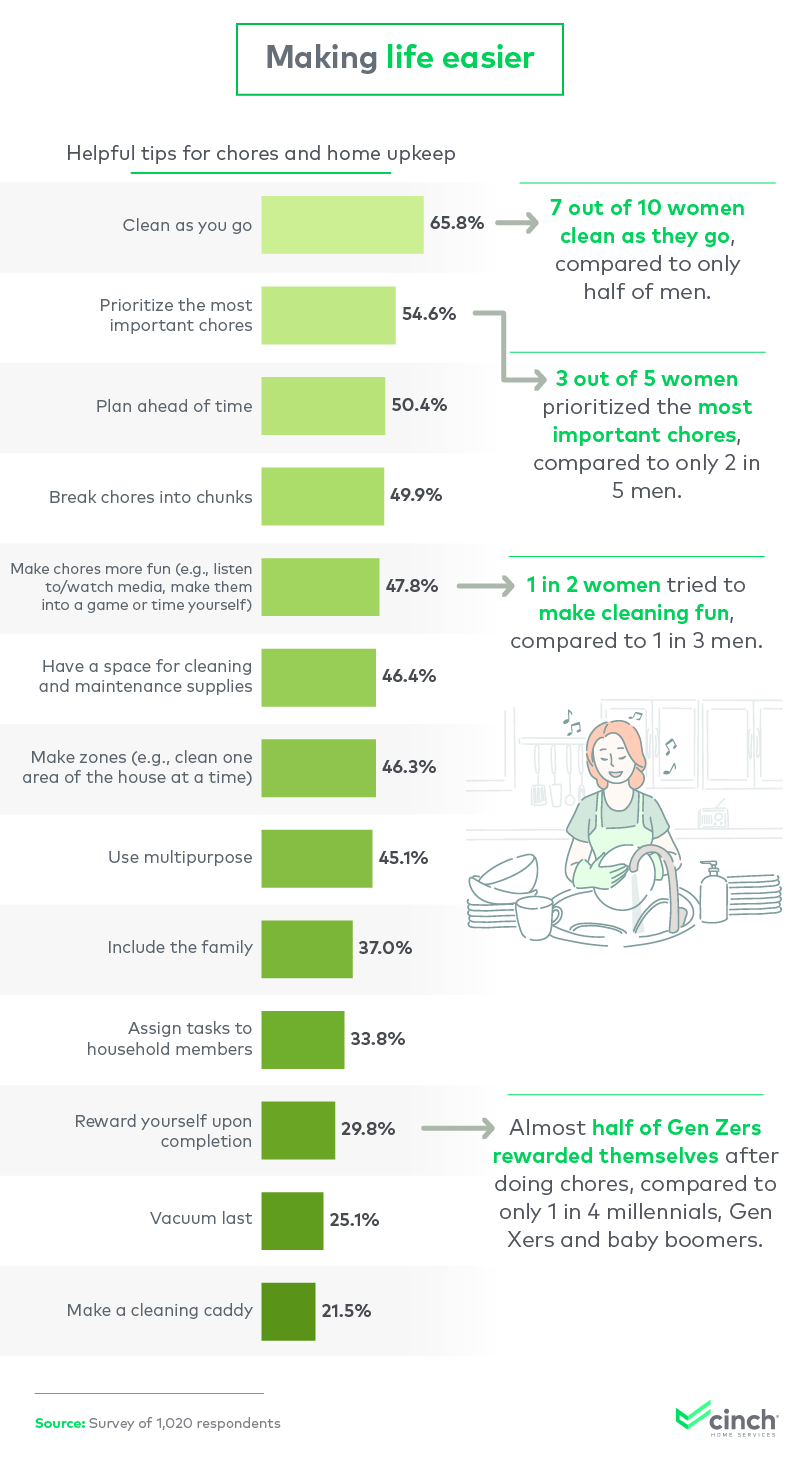
Cleaning as you go (as opposed to letting an enormous mess pile up) was the No. 1 tip from our entire pool of respondents. Women were especially keen on this trick, with 7 out of 10 recommending it (compared to just 50% of men). Planning ahead was also key—50.4% said to plan, and 54.6% said to prioritize—before executing.
And while younger generations weren't as likely to have dirty-chore-related experience, they did share some helpful tips to motivate them for the chores they did do. Gen Z often made their chores more fun by listening to music or turning them into a game. Gen Zers also commonly rewarded themselves after completing household tasks.
Making household chores simple
Even the dirtiest of jobs can be done with a little elbow grease and know-how, as respondents demonstrated. Many were willing to do the most unsightly of chores, like pumping the septic tank or even removing beehives. The top reason, however, wasn't pride or satisfaction; it was money.
Many of the chores respondents were willing to do were unnecessarily gross or even dangerous. And it's important to note that there are ways to both outsource to the professionals and save money. Cinch Home Services is exactly that option. Cinch offers a fresh, affordable approach to home protection, where a team of professionals will protect your home and related appliances through reliable warranties. Over time, you'll save money as well as protect your own health and safety. To get help from Cinch, head to our homepage today.
Methodology and Limitations
This study uses data from a survey of 1,020 Americans. Survey respondents were gathered through the Amazon Mechanical Turk survey platform where they were presented with a series of questions, including attention-check and disqualification questions. Participants incorrectly answering any attention-check question had their answers disqualified. 48.7% of respondents were men, while 50.6% were women. Less than 1% of respondents identified as nonbinary or other. Respondents ranged in age from 18 to 77 years old with an average age of 39. Gen Zers accounted for 16.4% of respondents, millennials for 38.4%, Gen Xers for 28.7% and baby boomers for 16.5%. This study has a 3% margin of error on a 95% confidence interval.
Please note that survey responses are self-reported and are subject to issues, such as exaggeration, recency bias and telescoping.
Fair Use Statement
Your audience is likely facing weekly chores themselves or is at least paying to avoid them. If you think they would benefit from the findings of this study, you are welcome to share the research. Just be sure your purposes are noncommercial and that you link back to this page.



